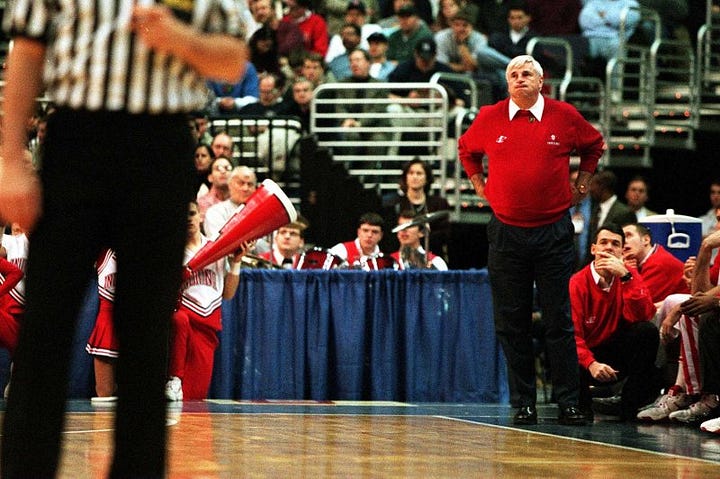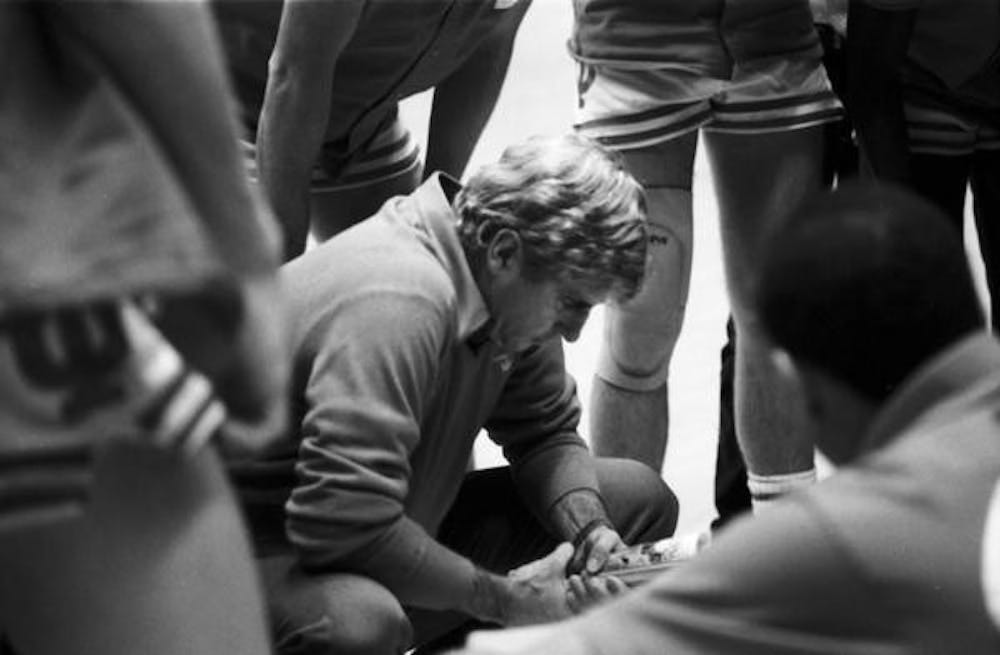Canzano: John Feinstein kept it real
Sportswriter dies at the age of 69.
I was in my mid-20s when I was hired by a daily newspaper to cover the Indiana University men’s basketball team and coach Bobby Knight.
I packed up, went to a bookstore, and bought a copy of John Feinstein’s book “A Season on the Brink.” I ripped through it on the airplane trip. It wasn’t just the fearless, unfiltered, all-access account of the 1985-86 IU basketball season — Feinstein’s book was the Rosetta Stone for the beat.
Feinstein died on Thursday.
He was 69.
I saw him in NCAA Tournament media rooms several times over the years. The guy loved college basketball. It was his thing. He didn’t know who I was, but I walked up to him once years ago, shook his hand, and thanked him for writing the book. He was polite and gracious. I was nervous.
Knight was a complex figure. Feinstein captured him masterfully. The coach could be intentionally difficult, obtuse, and petty. Alternately, he was genuine, loyal, smart, and heartfelt. You never knew what you’d get. Covering Knight was like being in a working relationship with a rototiller.
Ever used one?
When you’re in soft soil, the machine cuts through butter. It’s effortless and effective. But when you hit rock, roots, or a patch of dense clay, you’re liable to tear a tendon and dislocate your elbows.
Knight stood 6-foot-5. He had broad shoulders, a patch of white hair, and a pair of piercing eyes tucked beneath his eyebrows. When he walked into the room, you could feel his footsteps. He was bigger and broader in person than the man I saw coaching basketball on television as a kid.
The media interview room at IU had a small raised platform and lectern at the front with a microphone. The reporters generally sat in classroom-style school desks. The setup was essentially psychological warfare. And I remember thinking what a bad-ass Feinstein was for not pulling punches and doing Knight any favors.
The guy wrote what he saw.
Feinstein told me once: “I’ve always tried to take readers where they don’t get to go. That’s what reporters are supposed to do.”
Indiana’s basketball coach granted Feinstein full access. Things didn’t go as planned. IU lost four times in the first dozen games. The Hoosiers regrouped to finish second in the Big Ten, were awarded the No. 3 seed, then got upset in the opening round of the NCAA Tournament by No. 14-seed Cleveland State.


The journey of that season provided tremendous content and a first-hand look at what a disruptive, joyful, gnarled, exuberant mess a college basketball season can be. The book only worked because Feinstein was willing to take his readers with him, step by step, and hold Knight to that ‘all-access’ promise. I admire that.
Sports Illustrated columnist Pat Forde wrote a terrific column about the “Feinstein Seat” at Assembly Hall. The seat was far removed from press row, up in the corner of one of the end zones, and reserved for Feinstein whenever he came back to cover a game for The Washington Post.
It was banishment for writing the book.
Wrote Forde: “What Feinstein, 30 years old at the time, did in that book probably will never be done again. He told as honest a story as he could without sacrificing his journalistic ethics on the altar of access. He did not let the subject dictate the story. He did not sell out.”
While I was on the IU beat, the sports information director handed out printed box scores in the media room after games. One time, they were being passed out just as Knight walked in. Heads were down, poring over the box score. Knight was annoyed.
He quietly walked in, leaned into the microphone, and asked, “Anybody got a question?”
Heads went up.
Knight was already walking out of the room.
Another time, Indiana beat Temple in overtime at Assembly Hall. Hoosiers’ guard AJ Guyton hit the game-winning shot. Knight refused to let Guyton speak to reporters after the game. The locker room was closed. The IU coach was informed that, per Big Ten policy at the time, at least two players needed to be available to the media.
Knight obliged.
He sent out two freshmen who didn’t play in the game.
In November, I talked with Feinstein for 20 minutes on the phone. He’d just written his 50th book — a beautiful one about Ivy League football. Feinstein said he was dismayed with college football realignment. I think he wrote the book for himself as much as anyone else.
He said, “The Ivy League will never realign. It will never have nine teams or 10 teams or 12 teams. It will always have the eight teams it had when it was formed in 1956. USC and UCLA in the Big Ten — are you kidding me?”
We talked about Knight for a while that day. Feinstein told me he’d always be grateful for the access the coach provided. Knight was cruel to Feinstein after it was published. But Feinstein waved that off and pointed out that it was a lot like how Knight treated his old friend — turned enemy — Mike Krzyzewski.
After Krzyzewski’s father died, Knight left his own team for two days to go be with Coach K and his family. He wanted to be there for his friend. Feinstein told me: “Then when Krzyzewski became more successful than him, Knight turned on him.”
Feinstein then told a story about how Knight blew off the media in 1986 after an Indiana-Purdue game. The Hoosiers won the game, 71-70, in overtime. IU guard Steve Alford was unbelievable in securing the win. It was a nice victory over Purdue, a ranked and hated rival.
Knight arrived at the post-game news conference and announced that neither he nor Alford would speak that day. Knight called it a “beautiful day” and said that he needed to prepare for a hunting trip.
Feinstein walked down the hallway with Knight on the way out and said: “Bob, why would you do that?”
Knight said: “Just a little victory for me.”
Feinstein’s death was sudden. March Madness will go on without him for the first time in nearly 70 years. The world — and this business of sports writing — was better with him in it. John Feinstein kept it real. I’ll leave it at that. It’s probably time for me to dig out that book of his and give it another read.



Great column, John. Season On The Brink will always get the most attention because of the subject matter but the books John Feinstein wrote about the PGA Tour (A Good Walk Spoiled) & Patriot League College Basketball (The Last Amateurs) are outstanding books. There are so many books he wrote I lost count. If there is a list of the greatest sports writers ever he is easily top five on that list
Thanks John. I loved John Feinstein and used to visit with him in the lobby of the Sawgrass Marriott when The Players Championship was held in May. He was very kind to this “fanboy”. I am one of the few people that actually had a better opinion of Bob Knight after Feinstein’s book was released. I already knew he was a jerk. What I didn’t know was all he did for charity and his former players as well as the Bloomington community. But if you want to read Feinstein‘s best books buy yourself The Last Amateurs and The Civil War. Classics!